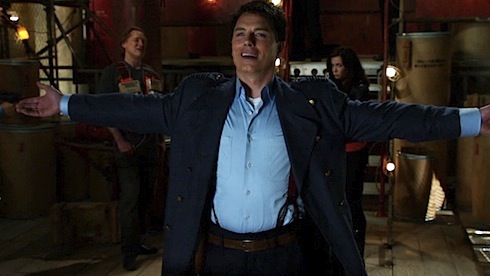The final installment of Torchwood: Miracle Day opens with Gwen telling a story to the camera about the day she first realized that her dad was a good and honorable man. She laments that her saving the world from the Miracle will kill him, and perhaps rob humanity of a million more just like him. But with a cock of her gun, she leaves to do just that.
The scene is a marvelous encapsulation, one which Russell T. Davies employs consistently and well. Gwen has suffered loss, is suffering loss, and will spread that suffering to others. But she’s moving forward, using the darkness that being in Torchwood has instilled within her to make the hard decision. Gwen’s emotional resolution will echo through the entire episode.
The impact of this scene is marred by the mismanaged series before it, though, and that carries through the entire finale of Torchwood: Miracle Day.
Spoilers ahead.
Gwen, Jack, and Ianto Oswald are in Shanghai following the path of Jack’s blood to the Blessing. On the other side of the planet in Buenos Aires, Rex and Esther do the same. They’re both using computers to follow a drip of blood, somehow, because even during a global Depression, there’s an app for that.

The precise locations of the Blessing are pinpointed and Rex mobilizes the CIA in Buenos Aires, which in turn mobilizes Charlotte, the mole that the Families have within the CIA. Charlotte eats up a lot of time in this episode, doing things that she imagines are delaying Torchwood but really aren’t. It gets a bit meta, as your frustration over having to watch her instead of the actual conclusion to this series begins to transfer to the character herself. This does pay off by the end, but it’s an annoying, distracting slog.
Meanwhile, down inside the Shanghai Blessing, the woman from last week’s episode (who isn’t named but is definitely a higher up in the Families, so we’ll call her Family Lady from here) is explaining to Jilly Kitzinger how the Blessing works: They don’t know what it is, but thanks to the marvels of the information age, they long ago figured out that anyone living around the Blessing dies at what would be the average age of death for humanity at that time. “The Blessing is calibrating a matrix in harmony with humanity!” she says, going moon-eyed. The Families caused the Miracle by rebooting the Blessing’s matrix with Jack’s blood, making immortality the new average. The Families had two amazing artifacts, Family Lady explains, gave them the chocolate-and-peanut-butter treatment, and ended up with a Miracle.
Before Torchwood heads out to the Blessing, they send each other some halting, awkward good wishes. Rex in particular is having a hard time coming to terms with how much he’s enjoyed being in Torchwood, even if Torchwood is particularly amateur. Even Gwen has become fond of Rex. The lot of them promise to stay friends after graduation.
In Shanghai, Oswald is feeling the weight of being able to die, and, having long since seen a kindred spirit in Jack, asks Jack who he really is. Jack comes clean and tells Oswald that he’s from the future, but that he doesn’t know how the events of the Miracle play out.
“One thing I do know. I’ve seen the stars. I have seen the universe, I have seen the human race become vast and magnificent and endless. And I wish you could see it, Oswald. I wish you could see that, too, because then you’d know how small you’ve made your life.”
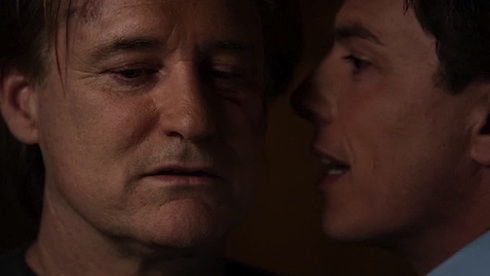
There’s a bit of plot-mopping that occurs as the teams head for the Blessing. In Wales, Rhys gets access to Gwen’s dad and tells him goodbye from the rest of the Cooper family. The truck in Buenos Aires containing the CIA team and a briefcase full of Jack’s blood gets blown up. And Charlotte herself blows up the DC CIA office, turning John de Lancie to bits (boo!) and damn near knocking herself out for purposes of credibility. Oh, and speaking of bombs, both Blessings have been outfitted with them to bury the exposed portion of the Blessing and prevent anyone Torchwoodish from ever tampering with them.
Jack, Gwen, and Oswald finally reach the Shanghai Blessing and the Family Lady tells Oswald that he’s not relevant. (We know!) Jack has suited Oswald up with a bomb, which makes little sense considering that the Family is already going to blow the place up. Considering that we’ve already seen the Family blow up its own in this series, Jack’s utterance of “Advantage: Torchwood” feels premature.
The three of them in Shanghai face the Blessing and Gwen asks Jack what exactly the Blessing is. He drops some Doctor Who terms but, laughing, admits he doesn’t know. The trio’s emotional arcs come to the fore as they face the vista in front of them. Gwen feels tremendous guilt over her actions in Torchwood and Jack initially feels the same for several lifetimes worth of actions, but is pleased to see that the good he’s done weighs evenly with the bad. Oswald makes a show of repenting for his actions, but quickly recovers. He is more accustomed to sin than even he realized.
Family Lady reveals that the Miracle is just the first part of a new world order where the Families determine who lives, who dies, for what, and why. She’s not worried that Jack will be able to wipe immortality from The Blessing, as he’d need to bleed out completely at both ends of the Blessing, both in Shanghai and in Buenos Aires. And considering that Rex and Esther have since been captured and all of Jack’s blood disposed of, this looks very unlikely.
A flurry of reversals occur. Rex has been transfused with Jack’s blood and the Families can’t shoot either him or Jack or risk the Miracle being nullified, so they shoot Esther. If the Miracle is reversed, Esther dies. Rex dies. Jack dies.
Gwen steps up. She’ll be shooting Jack herself. Rex has to carry on. No one should be able to decide who live and who dies, because the result are monsters like Oswald and the Families. With Jack’s near-gleeful acceptance, Gwen shoots Jack and Rex rips open his wound. They both bleed out into the Blessing and the Miracle ceases. Gwen’s dad dies, his daughter having brought death back into the world.
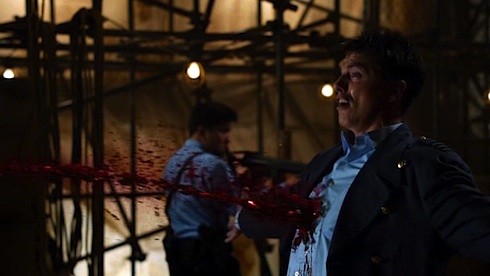
The Blessings are covered by explosions and Oswald gets his redeeming act by keeping the Family Lady down with him as Shanghai ignites. Jack is immortal once again, and wakes up just in time to escape with Gwen and Jilly. Rex and Esther are carted out of Buenos Aires and the screen goes white .
We’re in a church and a hymn is being sung. Down along a pew in the back the camera pans by Rhys, then Gwen, then Jack, then Charlotte, and then Rex. All five of them are singing at Esther’s memorial service.
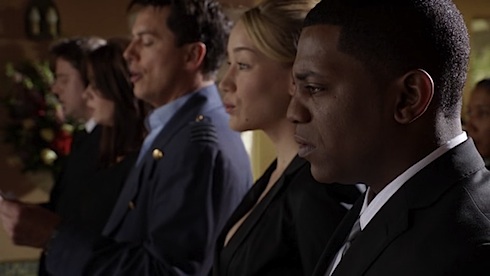
Jilly, meanwhile, reconnects with the Families, who reveal that as far as “trial runs go,” this one wasn’t bad. They almost succeeded. Time to move on to Plan B, is Jilly still interested?
After the service, Rex asks Gwen and Jack if Torchwood will continue, adding, “Say no, please.” Suddenly, Rex gets a message revealing Charlotte as the Families mole. Nearly as soon as he finds out, Charlotte blows a hole in him. This being a funeral for a CIA agent, Charlotte doesn’t get far before being gunned down herself. So that’s the end of her.
And the end of Rex. Or so we think. After a few moments of lifelessness, his wound begins to close, and he jumps to life with a gasp of air. He looks to Jack, “ what the hell did you do to me?”
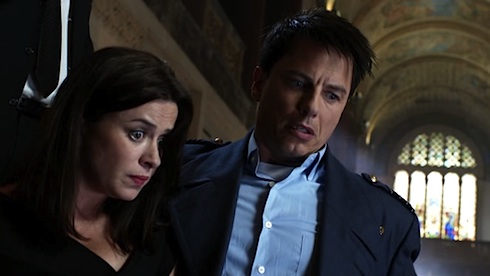
Chris’s Response: What is it about Torchwood that actively defies consistency? Seasons are wildly different in quality, episodes even more so, and characters and motivations always seem to change without reason. With Children of Earth, Russell T. Davies solved this issue by bringing a single authorial voice to the proceedings. So why didn’t that approach work here?
To be sure, “The Blood Line,” penned by Davies and fellow scribe Jane Espenson does give us some nice character moments, some reminders that, oh yeah, we actually care about these people and what they’re going through. But the mess we have to wade through to get to these moments dilutes the power of these characters. This is a shame when you’ve got actors like Eve Myles, Arlene Tur, Alexa Havins, Daniele Favilli, John de Lancie, and others delivering powerful and engaging performances. (How infuriating was Vera’s death? It was a dumb move on the part of the show, but we cared. Who cared when Wayne Knight got blown up? Seinfeld fans?) I’ve never really been a Gwen fan, but Eve Myles knocked it out of the park in this series.
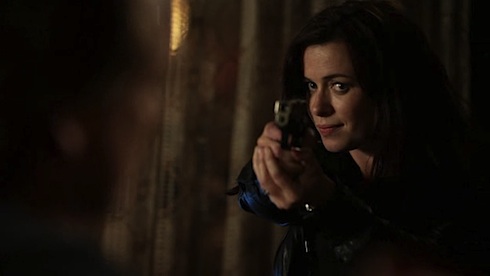
And that’s the quintessential problem with Torchwood: Miracle Day. There’s a lot of engaging elements mixed in with a lot of boring, borderline confused plotting. Most of Emily’s list of useless plot strands here still stands. Why did we need Oswald or Jilly? Why was Angelo introduced so late and then disposed of? Why did we get no character development of the main villains: the Families? All we found out was that they’re all-powerful and pretty fascist. You know what would have been interesting? If they had good reasons for kicking off the Miracle.
Why spend so much time building up smart characters like Esther and Vera, only to use them as sacrificial lambs to poorly developed villains? (The stereotypical ol’ boy running the camp for the former, and some guy we’d never even seen in the case of the latter.) Why didn’t the Families kill Jack when they had the chance earlier in the series? Why did we have an entirely circular plotline with rescuing Gwen’s dad when the point of his character was to be sacrificed, as well? What was the point of PhiCorp playing so heavily in the plot? Why are we watching what feels like a first draft?
When a TV show kicks up that many questions about its own plot, the sheer volume of inconsistency gets to be too much. You can’t stop thinking about why characters and motivations don’t make sense, and that has always been a major weakness of Torchwood. The characters aren’t strong enough or engaging enough to overlook the flaws within the show itself. (Shows like Buffy and Doctor Who excel at this. Plotholes are legion in both shows but you’re usually having too much fun to care.)
After the stellar Children of Earth, and a hell of an opening episode, Miracle Day fell into old patterns. In the beginning, I was excited about the possibilities. By the end, I was just waiting it for it to finish.
Emily’s Response:
Let me get this straight… the whole Angelo ploltline existed to show that the Families had Jack’s blood. Angelo himself was a useless character. The null plate under Angelo’s bed was a plot device to get Jack out of the mansion, even though he made it sound super important. Nice.
Also, what was the point of PhiCorp and stockpiling medication? As far as I can tell, here is the sequence of events leading up to Miracle Day: the Families found The Blessing. They figured out what they thought it did for the people living nearby. They guessed that maybe if they used some immortal blood it might make The Blessing do something wonky. Based on that intuition they started preparing with PhiCorp meds and various other schemes because they… had a funny feeling they could make everyone immortal using Jack’s blood? Because that’s more than a shot in the dark. That’s completely insane as far as reasoning out cause and effect goes. Good thing it served them so well.
And if the endgame was having the Families in charge of life and death in the world, then what was the use in having this whole fortune from selling PhiCorp medication anyway?
What did Oswald want again? Because Jack seemed to think that he wanted to die, but then it looked like he didn’t, but by the end he did again. I think. His motivations throughout the entire series were foggy at best. I sort of liked the fact that he went out showing that he was every bit the monster we knew he was, but there wasn’t enough of a build to give it that punch it needed.
And my personal favorite—there’s a mole in the CIA, so why don’t we tell someone working in the office that we know how to track the mole and get blown up for our trouble? Looks like the CIA needed to be this stupid in order to get Charlotte to Esther’s funeral so that Rex could get shot by her, and the audience could find out he was immortal. As narrative choices go, there has to be a way all of that could have come about without everyone being so willfully moronic.
Okay, I can’t help it: I like that fact that Rex lived. The idea of having another immortal around is kind of great, especially as it implies The Blessing sort of got confused and handed that immortality back to anyone possessing Jack’s blood. Rex doesn’t seem like the sort of guy who will handle it well, and maybe that will make it a good starting ground if Torchwood comes back and we get to see the team again. It gives Jack someone to look after, to guide through all the hardships that he has suffered through. That has potential. Then again, an eternity with Jack and Rex… that’s not the Batman-Robin duo I’d want guarding the Earth forever.
But the fact that the Families are still around? Not so much a fan of that. I’ll be real disappointed if Torchwood becomes a show about the team battling the Families. Torchwood doesn’t need one opposing team of baddies to fight each week. That’s was never the concept, and most shows that change to that format halfway through suffer and die miserably for it. Go away, Families. You do not get to be the Trickster’s Brigade of Torchwood.
Ryan’s Response:
Ten weeks ago, I had a lot of enthusiasm for Torchwood: Miracle Day, mostly because of my faith in Russell T. Davies and the near perfect-slam dunk that was Children of Earth. However, now with the conclusion of the mini-series, my disappointment is complete.
When SF enthusiasts talk about the latest installment from their favorite fictional series, we often focus heavily on plot stuff, red herrings, and things that didn’t make sense; inconsistencies with the fictional world. Torchwood certainly needs to taken to task for its violations of not only its disregard of Doctor Who universe continuity, but how serial plotting normally works. But there’s a deeper sin here.
And I think that sin is thematic confusion. What is the point of Miracle Day? I suppose it’s this: human beings who attempt to manipulate their fate or elevate themselves out of mere mortality will become power-hungry monsters. To put it another way, absolutely power corrupts, absolutely. To put it yet another way: snooze fest 2011. This theme has been visited by Russell T. Davies before. Many times.
In the final moments, Gwen says “no one should have the power to decide who lives and who dies” and we’re supposed to buy this because she’s staring at child-rapist/killer extraordinaire Oswald Danes. Even in this scene, this notion is contradicted, because Gwen decides for everyone right then and there. So, the writing allows Gwen to be paternalistic, but only to a point. This makes sense insofar as the origins of the Torchwood Institute itself are fairly paternalistic; their motto was once “if it’s alien, it’s ours” but really should be: “we know better.” Later, as everyone in the cast got killed off, it practically became “Jack and Gwen know better.” Though Davies and Espenson try to spice this up by having an insane killer/molester blow up the bad guys, that’s still what happens, Jack and Gwen fix everything for everybody else.
Speaking of Oswald, how are we supposed to feel about Oswald yelling “keep running!”? I bet the writers thought that was really edgy, but it comes across dumb. By dumb, I mean, it’s transparent what they’re trying to do thematically insofar as they’re just spelling out character traits. Gwen is GOOD, therefore she is allowed to decide when people live and die. Jack is also GOOD, and so he can, too. Oswald Danes is okay with being evil, so he’s EVIL. (Though useful for a second.) What about all those guards wandering around The Blessing all the fucking time? How do they feel about their “true selves?” I guess they’re just sort of okay, or NEUTRAL. The reason this kind of thing is so bad is because thematically all The Blessing really does is tell us how to feel about all the characters. The thematic core of the story is about people getting too much power, and yet The Blessing casually gives power to a few select characters and tells us that’s okay, because they’ve seen their true selves.
In the previous seasons of Torchwood, I didn’t mind this sort of thing too much. But, that’s also because the stories didn’t rely too heavily on the themes of conspiracies or ethical questions about decision makers. Miracle Day pretended to pose hard questions about ethics and in the end rendered those moot with The Blessing.
I’ll say one thing for it. For a show that tried to remind us how much humanity needs death to function, I couldn’t have been happier to see a lot of those characters get blown up. Except Esther. And Vera. Probably the only truly likeable characters in the whole show had to die horrible and ultimately meaningless deaths. Thematically, Miracle Day pulled a Tasha Yar on us with these two characters. Oswald Danes died doing something useful, Vera and Esther were killed for fun, by the writers. This kind of random plotting ended up being the ultimate theme of Miracle Day: nothing really matters.
Emmet Asher-Perrin is the editorial assistant at Tor.com. You can bug her on Twitter and read more of her work here and elsewhere.
Ryan Britt is the staff writer at Tor.com.
Chris Lough is the production manager of Tor.com. You can read the entirety of the Tor.com staff’s revolving Miracle Day recaps at this link.










